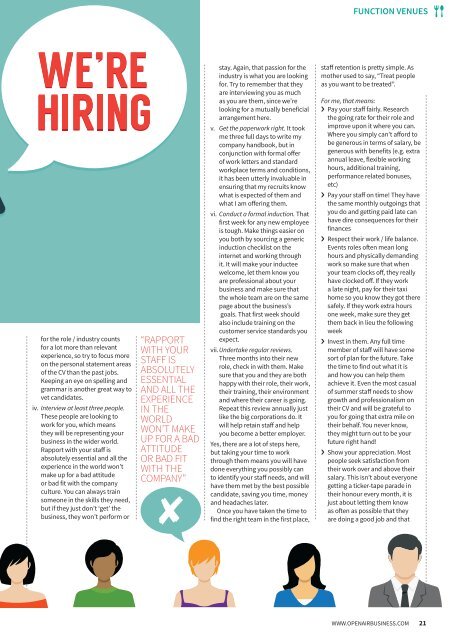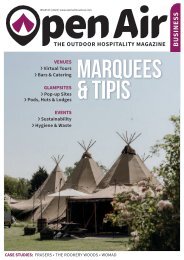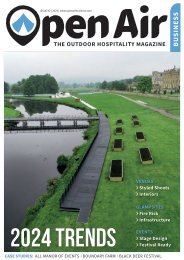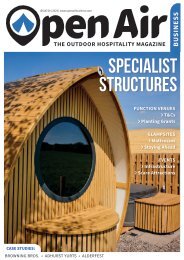Open Air Business November/December 2016
The UK's outdoor hospitality business magazine for function venues, glampsites and event organisers
The UK's outdoor hospitality business magazine for function venues, glampsites and event organisers
You also want an ePaper? Increase the reach of your titles
YUMPU automatically turns print PDFs into web optimized ePapers that Google loves.
FUNCTION VENUES<br />
for the role / industry counts<br />
for a lot more than relevant<br />
experience, so try to focus more<br />
on the personal statement areas<br />
of the CV than the past jobs.<br />
Keeping an eye on spelling and<br />
grammar is another great way to<br />
vet candidates.<br />
iv. Interview at least three people.<br />
These people are looking to<br />
work for you, which means<br />
they will be representing your<br />
business in the wider world.<br />
Rapport with your staff is<br />
absolutely essential and all the<br />
experience in the world won’t<br />
make up for a bad attitude<br />
or bad fit with the company<br />
culture. You can always train<br />
someone in the skills they need,<br />
but if they just don’t ‘get’ the<br />
business, they won’t perform or<br />
“RAPPORT<br />
WITH YOUR<br />
STAFF IS<br />
ABSOLUTELY<br />
ESSENTIAL<br />
AND ALL THE<br />
EXPERIENCE<br />
IN THE<br />
WORLD<br />
WON’T MAKE<br />
UP FOR A BAD<br />
ATTITUDE<br />
OR BAD FIT<br />
WITH THE<br />
COMPANY”<br />
stay. Again, that passion for the<br />
industry is what you are looking<br />
for. Try to remember that they<br />
are interviewing you as much<br />
as you are them, since we’re<br />
looking for a mutually beneficial<br />
arrangement here.<br />
v. Get the paperwork right. It took<br />
me three full days to write my<br />
company handbook, but in<br />
conjunction with formal offer<br />
of work letters and standard<br />
workplace terms and conditions,<br />
it has been utterly invaluable in<br />
ensuring that my recruits know<br />
what is expected of them and<br />
what I am offering them.<br />
vi. Conduct a formal induction. That<br />
first week for any new employee<br />
is tough. Make things easier on<br />
you both by sourcing a generic<br />
induction checklist on the<br />
internet and working through<br />
it. It will make your inductee<br />
welcome, let them know you<br />
are professional about your<br />
business and make sure that<br />
the whole team are on the same<br />
page about the business’s<br />
goals. That first week should<br />
also include training on the<br />
customer service standards you<br />
expect.<br />
vii. Undertake regular reviews.<br />
Three months into their new<br />
role, check in with them. Make<br />
sure that you and they are both<br />
happy with their role, their work,<br />
their training, their environment<br />
and where their career is going.<br />
Repeat this review annually just<br />
like the big corporations do. It<br />
will help retain staff and help<br />
you become a better employer.<br />
Yes, there are a lot of steps here,<br />
but taking your time to work<br />
through them means you will have<br />
done everything you possibly can<br />
to identify your staff needs, and will<br />
have them met by the best possible<br />
candidate, saving you time, money<br />
and headaches later.<br />
Once you have taken the time to<br />
find the right team in the first place,<br />
staff retention is pretty simple. As<br />
mother used to say, “Treat people<br />
as you want to be treated”.<br />
For me, that means:<br />
› Pay your staff fairly. Research<br />
the going rate for their role and<br />
improve upon it where you can.<br />
Where you simply can’t afford to<br />
be generous in terms of salary, be<br />
generous with benefits (e.g. extra<br />
annual leave, flexible working<br />
hours, additional training,<br />
performance related bonuses,<br />
etc)<br />
› Pay your staff on time! They have<br />
the same monthly outgoings that<br />
you do and getting paid late can<br />
have dire consequences for their<br />
finances<br />
› Respect their work / life balance.<br />
Events roles often mean long<br />
hours and physically demanding<br />
work so make sure that when<br />
your team clocks off, they really<br />
have clocked off. If they work<br />
a late night, pay for their taxi<br />
home so you know they got there<br />
safely. If they work extra hours<br />
one week, make sure they get<br />
them back in lieu the following<br />
week<br />
› Invest in them. Any full time<br />
member of staff will have some<br />
sort of plan for the future. Take<br />
the time to find out what it is<br />
and how you can help them<br />
achieve it. Even the most casual<br />
of summer staff needs to show<br />
growth and professionalism on<br />
their CV and will be grateful to<br />
you for going that extra mile on<br />
their behalf. You never know,<br />
they might turn out to be your<br />
future right hand!<br />
› Show your appreciation. Most<br />
people seek satisfaction from<br />
their work over and above their<br />
salary. This isn’t about everyone<br />
getting a ticker-tape parade in<br />
their honour every month, it is<br />
just about letting them know<br />
as often as possible that they<br />
are doing a good job and that<br />
WWW.OPENAIRBUSINESS.COM 21


















